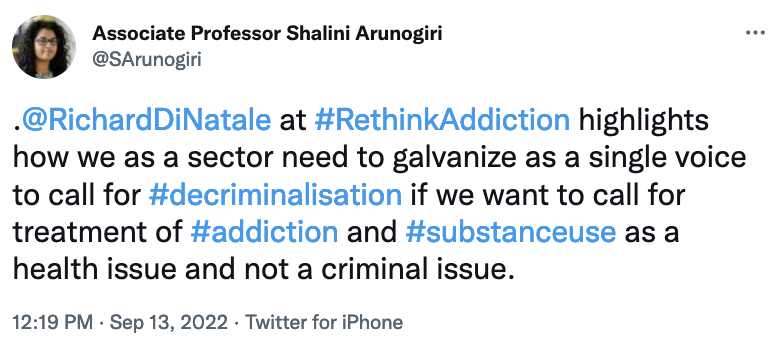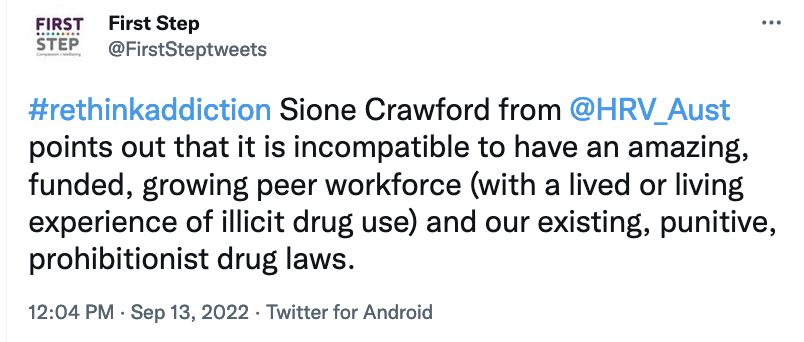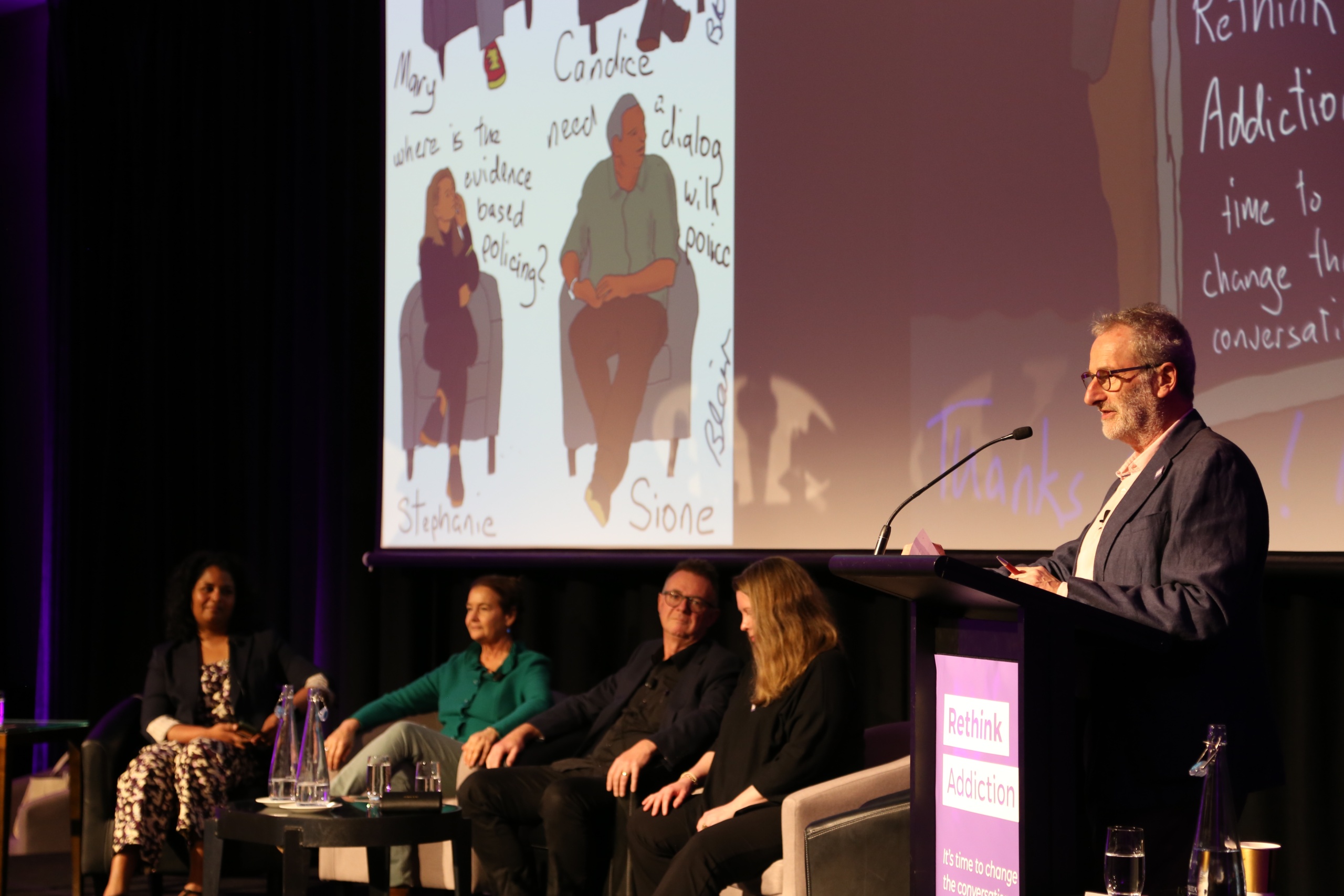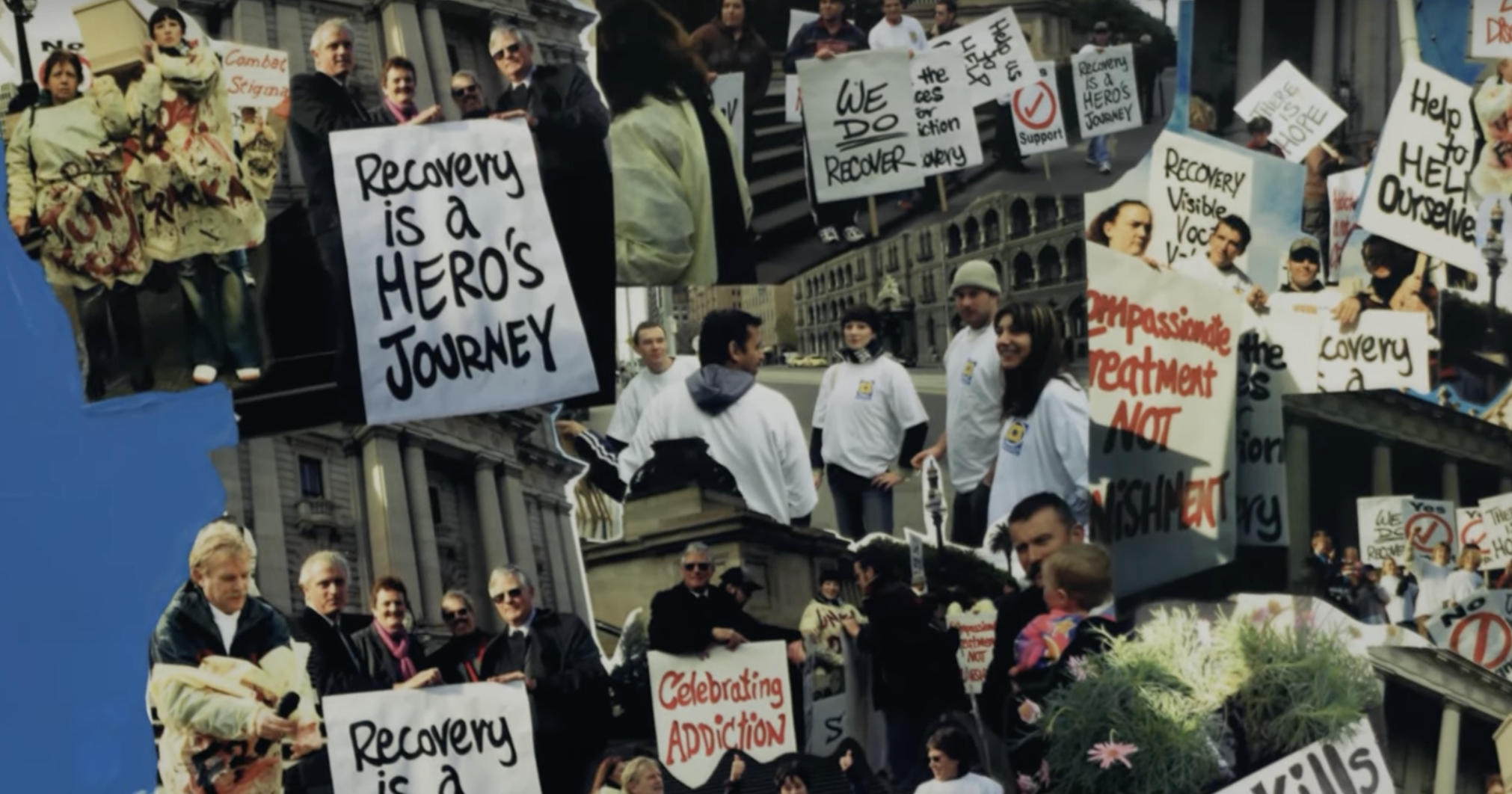Introduction by Croakey: Last week, the New South Wales Government released a long-awaited response to the 2020 Inquiry into crystal methampetamine (‘ice’).
While health leaders including the Royal Australasian College of Physicians were pleased that some of the recommended changes are to be adopted, they emphasise that more needs to be done to ensure the response is health-focused, appropriately resourced and evidence-based, Croakey editor Marie McInerney reports below.
The Ice Inquiry was one of many topics discussed at the recent Rethink Addiction conference.
In her latest article for Croakey News Conference Service from the conference, McInerney discusses ten takeaways, highlighting the critical need to address drug, alcohol and gambling addictions as health issues, rather than criminal.
Marie McInerney writes:
Australia needs to reclaim its former position as a global leader in harm reduction for drugs, through initiatives such as supervised injecting rooms, pill testing and drug checking, and to find the political courage to reform drug laws that send too many people to prison instead of into healthcare.
It also needs to reinstate critical inter-government arrangements for health and justice ministers that lapsed during the COVID-19 pandemic, restore already inadequate funding to the alcohol and other drugs (AOD) sector which, without indexation, has slipped further backwards over the past decade, and address gambling addiction also as a health issue.
These were among many calls for action to emerge from the recent Rethink Addiction conference, held earlier this month in Canberra.
The conference heard that only about a third of Australians who need support for addictions can currently access them.
“When would that happen in cancer treatment, (to be told) well we might treat one-third of you, (if you) prove that you really want it?” Australian Alcohol and other Drugs Council (AADC) CEO Melanie Walker asked in one panel session.
The conference focused on the impact of stigma, which can mean people with addictions put off seeking treatment for years or even decades. But it heard that stigma is also experienced by addiction health professionals who see themselves placed at “the bottom of the barrel” in the medical hierarchy.
Ten takeaways
Below are ten takeaways from Rethink Addiction sessions and ongoing events.
1. “Addictions are health and social issues, not criminal issues”
The conference heard many calls for the long-delayed response from the New South Wales Government to its landmark 2020 inquiry into crystal methamphetamine (‘ice’) addiction, with hopes it would invest more in treatment and care and also take up recommendations to decriminalise personal use and introduce harm reduction initiatives.
The inquiry, set up after the tragic deaths of six young people who attended music festivals in New South Wales in just over a year, reported that Australia has the highest rate of amphetamine dependence in the world and, of all the world’s regions, Australasia has, by a substantial margin, the highest rate of all cause deaths associated with amphetamine dependence.
Finally, the Government’s response was announced last week, underscoring the ongoing political resistance to drug reform and the scale of the challenge facing the sector.
Rethink Addiction coalition partners like the Royal Australasian College of Physicians (RACP) were pleased the Government adopted 86 of the Inquiry’s 109 recommendations, including the development of a much-needed New South Wales drug policy and $500 million in funding “to support the severely under-resourced and overstretched” AOD sector and workforce.
But there was big disappointment, if not surprise, that the Government rejected the inquiry’s calls for more supervised injecting centres, piloting of syringe programs in jails, and pill testing, and only committed to delayed action on a pre-court diversion measure for drug users.
“The response doesn’t go far enough to ensure personal addiction issues are treated as health and social issues, not criminal ones,” said Dr Adrian Dunlop, President of the RACP’s Australasian Chapter of Addiction Medicine.
Dunlop, a speaker at the Rethink Addiction conference, told delegates there that the most frustrating part of working in the drug and alcohol field for decades was the “ongoing de-prioritisation” of approaches that are proven to work due to stigma and shame around addiction.
“It’s not a priority for federal governments. It’s not a priority for state governments. It’s de-prioritised all the time,” he said. “They have to see our patients, this community, as an important part of their community, and they don’t.”
2. No national governance frameworks: key Ministerial forum abandoned
The conference highlighted, as the Australian Alcohol and other Drugs Council (AADC) put in its 2022 Federal Budget submission, that there is no formal national structure for inter-governmental engagement, oversight and decision-making on alcohol and other drugs.
The AADC’s Melanie Walker told delegates that National Cabinet arrangements set up in the early days of COVID-19 led to the lapsing of formal advice arrangements on alcohol and other drug (AOD) issues to federal, state and territory governments – something the new Labor Federal Government had been “a little bit shocked” to learn about.
They “had wondered why they weren’t getting a really strong voice of advice,” she said. The replacement of the Council of Australian Governments (COAG) with the National Cabinet had led to the disestablishment of the Ministerial Drug and Alcohol Forum that brought together health and justice Ministers, and an Inter-governmental Committee on Drugs.
(Croakey has asked Assistant Minister for Mental Health, Suicide Prevention, and Rural and Regional Health Emma McBride if the Forum will be reinstated and what other plans the new Federal Government has for addiction treatment and support. We will report her response when we receive it.)
Funding for the AOD sector has also foundered over the past decade, Walker said, with no indexation of federal government contracts to services, not just through the Health Department but also the National Indigenous Australians Agency, since the landmark 2014 New Horizons report on alcohol and other drug treatment services in Australia.
“So while there was not a conscious government decision to reduce funding to those services, without indexation that’s what’s occurred,” Walker said.
She revealed that staff at one of AADC’s member organisations had voted to downgrade their positions to keep doing the jobs they were doing rather than see many colleagues have to leave and services be halved.
She added there has also been no funded national peak, since then Coalition Assistant Health Minister Fiona Nash defunded the Alcohol and other Drugs Council of Australia (ADCA) in 2013, until the current financial year, when the AADC received a small amount of funding.
3. Ministers are FOR gambling not for gambling reform
Carol Bennett, CEO of the Alliance for Gambling Reform, also pressed the urgent need for gambling harm to be addressed as a public health issue, saying she hoped the focus on integrity at the 2022 federal election will galvanise public concern about conflicts of interest between governments and the gambling industry.
Bennett said there is “not a single person in any health department, anywhere in Australia, that deals with gambling related harm”, while the Ministers she has to approach for action are all Ministers for Gaming and Racing versus any formal portfolio to address gambling harm.
“They’re for gambling,” she said, adding that they clearly represent the interests of industry, forming alliances with industry, having industry logos on their website, and even adopting industry language, such as with the Victorian Responsible Gambling Foundation.
Bennett said Australia also lacks any inter-governmental committee to address gambling harm.
Independent MPs Mr Andrew Wilkie and Rebekha Sharkie are currently moving to establish a Parliamentary Friends on Gambling Harm Reduction committee, though Bennett warned: “At the moment, our biggest strength is our independence to be honest, because both major parties are very conflicted by funding they received from the gambling industry.”
4. A third of those in need cannot access AOD treatment
AADC’s budget submission states that alcohol and other drug (AOD) services are acutely underfunded versus real levels of community need. It quotes the 2014 New Horizons Report that calculated that the $1.26 billion being provided in total funding to deliver AOD services at that time met between only 30-50 percent of total service demand.
AADC’s Melanie Walker said the sector doesn’t need a magic bullet to transform treatment and care, “we just need to increase the capacity in the sector”.
According to the AADC, over the past five years the National Ice Action Strategy (NIAS) delivered an additional $450 million to AOD services nationally but, despite a positive March 2021 evaluation, no decision was made on the future of the funding beyond July 2022
Speakers at the conference raised concern about multiple gaps and needs in services, from the lack of qualified youth detox beds and youth addiction specialists (Dunlop said he believed there were just two in all of Australia) to the refusal of many GPs to treat people with drug addictions, and many other restrictions on people receiving pharmacotherapy. Beyond those are the role of many social and cultural determinants of health, including housing.


Link to the article in the MJA: When will opioid agonist therapy become a normal part of comprehensive health care?

5. “I needed mental health support and I was treated like a criminal”
Former Greens leader Richard di Natale, a former GP and drug and alcohol clinician and now public health advisor for cohealth, spearheaded the push for decriminalisation of drugs during his years in the Senate. He urged Rethink Addiction delegates to galvanise as a single voice on the issue, to convince politicians and the broader community that drug use is not a crime but a health issue.

His call followed a panel discussion on criminalisation, with Rethink Australia warning that the failed ‘war on drugs’ has resulted in “a larger drug market, more dangerous drug supply, and growing prison populations and waitlists for treatment services”.
The panel featured Baden Hicks, a peer support worker at the Turning Point addiction research, treatment and education centre in Melbourne, who worked this year in Victoria to generate support for a bill put forward by Reason party MP Fiona Patten to decriminalise drugs.
Hicks talked at the conference about losing his supports during a COVID-19 lockdown when he relapsed on methamphetamines and developed psychosis. His mother called a mental health triage team, but “they said, because there are drugs involved, this isn’t a mental health issue, this is a criminal issue”.
As a result, he said, dozens of police in full critical incident response gear turned up to his house. “It didn’t go well…I was going through some tough things at the time and I was treated as a criminal”, he said, urging a rethink on understandings of and responses to drug-taking.
The session also heard from Rocket Bretherton, who said she started using drugs when she was five or six and has spent most of her adult life going in and out of prison, always in relation to drugs. Her recovery breakthrough was being part of the ground-breaking Bird’s Eye View podcast made with women in the Darwin Correctional Centre and now with the high-profile Justice Reform Initiative and its #JailingIsFailing campaign.
“My voice was being heard for the first time in my life. I was speaking and being freaking heard and what I was saying was freaking important,” she said, urging more support for people leaving prison, more harm reduction initiatives, and change to threshold quantity laws that deemed high personal and social use as “trafficking”.

Marion McConnell, a founding member of Families and Friends for Drug Law Reform, told the conference she had been shocked 30 years ago when she was called to a local oval where her son had overdosed on heroin.
But the bigger shock, she said, was the way the police treated him and her, “the way they questioned me and treated me like a criminal while my son (could have been) dying”.
Tragically, her son died of another overdose just two weeks later, fearful both of the police and the dealers he was being pressured to name. This launched McConnell and her late husband into decades of ongoing advocacy for drug law reform, to treat drugs as a health issue, rather than a law and order issue.
“I was determined that these laws were wrong. They were hitting the wrong people. They were made for the wrong reasons. And I just felt something had to be done about it,” she told the conference.


6. Australia has to reclaim its place as a global leader in harm reduction
The conference heard that Australia had once been a global leader in harm reduction, an early adopter of needle and syringe programs and medically supervised injecting services.
The head of NSW’s ice inquiry, Professor Dan Howard, said many of those programs were criticised at the time as being too radical and required “leadership and no small amount of courage” from government, but their impact was “now widely regarded as a triumph of public health policy”.
However Howard said that momentum had stagnated, and criminalisation gives “tacit permission to turn a blind eye to the factors driving most problematic drug use: trauma, childhood abuse, domestic violence, unemployment, homelessness, dispossession, entrenched social disadvantage, mental illness, loneliness, despair and many other marginalising circumstances that attend the human condition. This is a profound flaw in our approach to illicit drug policy.”
The conference was told that New South Wales was not alone in its reluctance to take action, with the Victorian Government also failing yet to respond to an inquiry into cannabis use, which has recommended legalising the drug for adult personal use, similar to the model recently introduced in the Australian Capital Territory.
The sector’s eyes are also on the ACT for the results of Australia’s first fixed-site pill testing service, launched in July as a six-month pilot.
The conference heard about other welcome initiatives at home and internationally, that included:
- A vending machine for opioids has that has opened in Toronto to help fight the Canadian city’s overdose crisis
- Text the Effects anonymous SMS service run by Australia’s Alcohol and Drug Foundation
- the New South Wales collaboration between NUAA and the Ministry of Health and others to produce evidence-based drug alerts when there is a significant and proven risk of harm in drug supply.

7. “This doesn’t seem to be evidence-based policing”
The conference heard how individual police officers often played a crucial role in people’s survival and recovery, but that systemic and cultural issues saw police often having to be “dragged kicking and screaming” towards evidence-based reform, particularly on drug laws but also, for example, on public intoxication laws in Victoria.
Veteran ABC broadcaster Jon Faine, who was moderating the panels, said every ex police commissioner he had interviewed over 30 years in Victoria, “absolutely believes that the war on drugs is futile” but they only spoke out after leaving office and with little impact.
Keith Banks, a former Queensland Police undercover officer and author, said that was in part because of the power of conservative police unions, often protecting their own patch, but also that police commissioners are appointed by governments not independent boards, and that to reach elevated ranks “you must start at the bottom”. He urged Australia to follow the UK lead and allow lateral entry to the police force, so more people from outside policing enter the command structure.
“That’s how you change the culture,” he said, telling the conference he had become a full advocate for decriminalisation after his undercover work and that all police trainees would benefit from hearing from people with lived experience of addiction.
Stephanie Tzanetis, from the Penington Institute, told the conference there was “no evidence really” to support many efforts to reduce supply of drugs, but there was evidence that “some approaches to trying to stop supply cause unintended harm”.
That included in festival settings, where authorities refused to provide drug checking services, yet permitted sniffer dog operations that, she said, regularly leads to strip searching in NSW and Victoria. Invariably only small amounts of cannabis are involved, but these heavy-handed approaches caused trauma and did not lead to the pathways to education and support that a public health approach like testing would. “This doesn’t seem to be evidence-based policing”, she said.
Penington Institute’s 2022 instalment of Australia’s Annual Overdose Report, marks the seventh consecutive year that overdose deaths have exceeded the road toll.

8. Workforce issues: “right down the bottom of the list”
The conference heard that the stigma that affects people with addictions also impacts on those who work in the field, who are “right down the bottom of the list” in the medical hierarchy, according to Associate Professor Shalini Arunogiri, an addiction psychiatrist, researcher, and chair of the RANZCP’s Faculty of Addiction.
Dr Adrian Dunlop warned that addiction medicine “will be extinct” in about 15 years. “We’re all getting too old, there’s not enough young people coming in and so we need to double, triple, quadruple the numbers if we’re going to remain viable as a specialty,” he said, calling for scholarships, awards, education support, and better unionisation in the sector.
Arunogiri said reasons for the sector’s low status included a lack of visible leadership and that the sector did not often share “what we see in terms of the capacity to see people’s lives transformed, (that we) see people get better…We don’t share the stories that treatment actually works,” she said, highlighting the strong evidence base around opioid therapy.
She said stigma, the way society sees addiction, “actually infects the whole of the sector”, including recruitment to its professions. “If we don’t see it as a health disorder, why would you need health professionals to treat it?”, she said, urging the sector to challenge that paradigm.
9. “Reaching somebody when no one else can”: peer workforce
Mary Harrod, CEO of NSW Users and AIDS Association (NUAA), echoed many comments at the conference on the importance of lived and living experience in addiction, saying that so often the peer workforce are “the ones who can reach somebody when no one else can”.
Heather Pickard, former Chief Executive Officer of the Self-Help Addiction Resource Centre (SHARC), talked about how her move into long term recovery 29 years ago enabled a career in senior leadership in the alcohol and drug sector.

Pickard said the growth of the lived and living experience workforce under Victoria’s mental health reforms was “extraordinary and fills my heart with joy” but she warned the sector should not “swing way wide and think lived/living experience is everything”. The divide between clinician and lived experience is not helpful as both can play an important part in support for people at different times in their lives, she said.
Sione Crawford, CEO at Harm Reduction Victoria, warned of ongoing risks to the whole lived living experience workforce without decriminalisation, saying it was “completely incompatible to have a lived /living experience AOD workforce and to expect them to be safe in the face of the drug laws we have, which criminalise us.” AOD use is a continuum and even those who don’t intend to, may return to using and be criminalised and at risk, he said.

10. No one-size-fits-all
Associate Professor Shalini Arunogiri said much more clarity is needed in the treatment sector that some approaches are not evidence-based, while others, such as opioid pharmacotherapy and peer support are, and therefore need to be promoted, invested in, scaled up and made accessible for people who need them.
Arunogiri said there is no expectation in the health sector that someone with diabetes or asthma or other long-term issue would immediately “be able to be fixed”.
Rather, she said, they would benefit from a range of different treatments and often multidisciplinary approaches over a period of time with, importantly, the onus not on the individual and whether they have “done the right thing”.
Health care works with stepped care models, for instance in cancer treatment, she said, where if the first treatment does not work, clinicians agree to “step it up a notch”. But that approach is not applied in drug and alcohol treatment, which is “a one size fits all space”, where if a treatment doesn’t work, it’s often simply tried again. Australia lacks an outcomes framework “that actually looks at what good treatment looks like”, she said.



Finding help
Lifeline 13 11 14 www.lifeline.org.au
Suicide Call Back Service 1300 659 467 www.suicidecallbackservice.org.au
Kids Helpline 1800 55 1800 www.kidshelpline.com.au
MensLine Australia 1300 78 99 78 www.mensline.org.au
Coronavirus Mental Wellbeing Support Service 1800 512 348
Head to Health National Phone Service (1800 595 212, www.headtohealth.gov.au)
Head to Health Adult Mental Health Centres (www.headtohealth.gov.au/supporting-yourself/adult-mental-health-centres)
QLife – phone peer support service by LGBTIQ+ peers for all ages. 3pm-midnight. 1800 184 527 or webchat www.qlife.org.au
If you are concerned about suicide, living with someone who is considering suicide or bereaved by suicide – the Suicide Call Back Service is available at 1300 659 467 or www.suicidecallbackservice.org.au.
Gambling help: For free 24/7 gambling support, call 1800 858 858 or contact www.gamblinghelponline.org.au
Help with alcohol and other drugs: For 24/7 free, confidential alcohol or other drug support, contact www.counsellingonline.org.au or call the National Alcohol and Other Drug Hotline 1800 250 015 to speak to someone in your state. Click here to find out more.
Follow @croakeynews, @marieMcinerney and #RethinkAddiction for Tweets from the conference, with additional coverage via @wepublichealth and @alisonsbarrett.
See these Twitter threads for detailed live-tweeting from the sessions on criminalisation, harm reduction and drug treatments.
Bookmark this link to see all our conference coverage and follow the #RethinkAddiction Twitter list.










